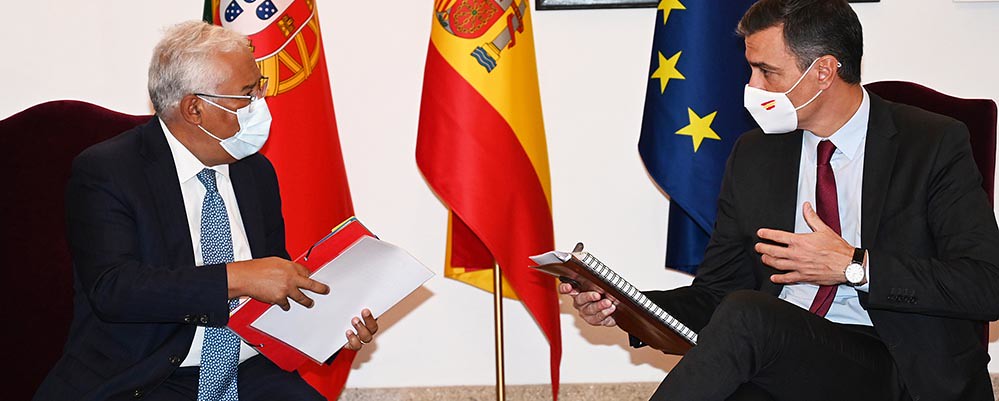The government of Portugal exposes the government of Spain with its help to Ukraine
Spain and Portugal have socialist parties in their governments, but the Spanish government also has communist ministers, and that makes a difference.
Portugal sends weapons to Ukraine: rockets, grenades, ammunition and assault rifles
Last night, at 0:55 CET, in a message posted on its official Twitter channel, the Portuguese Ministry of Defense announced the aid it will send to Ukraine, an aid that includes weapons:
A pedido das autoridades ucranianas, Portugal irá disponibilizar equipamento militar como coletes, capacetes, óculos visão noturna, granadas e munições de diferentes calibres, rádios portáteis completos, repetidores analógicos e espingardas automáticas G3.
— Defesa Nacional (@defesa_pt) February 26, 2022
The message indicates that Portugal will send Ukraine "military equipment such as rockets, helmets, night vision goggles, grenades and ammunition of different calibers, complete portable radios, analog repeaters and G3 automatic rifles." A remarkable help considering that Portugal is one of the poorest countries in the European Union and its military resources are rather modest.
Spain does not send weapons, only medical and protection material
At 17:32 CET, in a message posted on its official Twitter channel, the Spanish Ministry of Defense announced the material it will send to Ukraine, a shipment that does not include weapons of any kind:
Defensa envía 20.000 kilos de equipos de protección individual y material sanitario a Ucrania, proporcionado por el @EjercitoTierra, en dos aviones A400M del Ala 31 de Zaragoza @EjercitoAire que han salido hoy de Torrejón con destino a Polonia.
⬇️https://t.co/faCxbn12Wn pic.twitter.com/F24MLc7Bmi— Ministerio Defensa (@Defensagob) February 27, 2022
According to the statement from the Ministry of Defense linked in that tweet, the material sent consists of "20,000 kg of personal protective equipment and medical supplies destined for Ukraine. The planes will land and leave the cargo at a Polish airport, near the border with Ukraine, where it will be picked up by the authorities of this country. The cargo transported by the planes consists of medical supplies (masks, gloves and medical protection suits) and defense and personal protection supplies provided by the Army (helmets, anti-fragment vests and NBC protection)."
An incomprehensible difference that can only be explained by the communist half of the Spanish government
Spain has many more resources and much better equipped Armed Forces than those of Portugal, so this notable difference between one country and another is incomprehensible when it comes to sending aid to a country that is being attacked and that needs something more than health and protection material to defend against the invader. The origin of this difference must be sought in the presence of communist ministers in the Spanish government.
Podemos was described as a "pro-Russian party" by the Pravda newspaper in 2014
In Portugal, the Socialist Party governs alone, while in Spain the PSOE governs with Podemos, a party that has been supported by the propaganda media of the Putin regime, which criticized the sanctions against Russia for the 2014 invasion of Ukraine and that same year was described as a "pro-Russian party" by the Russian communist newspaper Pravda. The position of the communist faction of the Spanish government was called into question once again this Friday, when the Spanish Communist Party - to which Vice President Yolanda Díaz and Consumer Affairs Minister Alberto Garzón belong - supported a demonstration against NATO in which they did not no criticism was made of either Russia or Putin.
Vox calls for the dismissal of "Putin's allies" in the government
The harmony of leaders of Podemos and Izquierda Unida -the two parties that group the communist half of the government- with the Putin regime was denounced yesterday by the third most voted party in Spain. Vox pointed out that "Pedro Sánchez has Putin's allies in his government who must be dismissed." The party led by Santiago Abascal indicated some names, not only of Podemos, but also of the PSOE: "Enrique Santiago, Montero, Lastra... these are the members of the Government that are part of the Puebla Group, the narco-communist network that demands the withdrawal of sanctions on Russia."
---
Photo: La Moncloa. The President of the Government of Spain, Pedro Sánchez, talks with the Prime Minister of the Portuguese Republic, António Costa, during a meeting between the two at the Palacio de San Carlos, in Trujillo (Cáceres, Spain), on October 28, 2021.
|
Don't miss the news and content that interest you. Receive the free daily newsletter in your email: Click here to subscribe |
- Most read
- The Pegasus case and how it could end with Pedro Sánchez due to a decision by France
- A large collection of Volkswagen cars hidden in an abandoned mine in Switzerland
- The ten oldest national flags in the world that are still in use today
- The real reason for Sánchez's victimizing letter using his wife as an excuse
- Sánchez wants to muzzle the media he does not control: we will not shut up!
- Lenin: numbers, data and images of the crimes of the first communist dictator
- What did Morocco find in Pedro Sánchez's cell phone to humiliate him in this way?

 ES
ES





Opina sobre esta entrada: